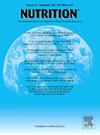老年人膳食B族维生素摄入量与认知功能之间的关系:一项观察性研究
IF 3.2
3区 医学
Q2 NUTRITION & DIETETICS
引用次数: 0
摘要
目的:本研究旨在调查美国老年人膳食维生素B摄入量与认知障碍患病率之间的关系。方法基于2011年至2014年全国健康与营养检查调查2716名60岁及以上参与者的数据进行横断面分析。通过两次24小时的饮食回顾来评估6种B族维生素(维生素B1、B2、烟酸、B6、总叶酸和B12)的膳食摄入量。认知功能通过阿尔茨海默病单词列表学习测试、动物流畅性测试和数字符号替代测试进行评估。采用多变量logistic回归、限制性三次样条回归和加权分位数和回归分析膳食B族维生素摄入量与认知障碍之间的关系。结果较高的膳食B族维生素摄入量与认知障碍患病率呈负相关。与摄入维生素B1 (OR = 0.53, 95% CI: 0.29-0.97)、维生素B2 (OR = 0.54, 95% CI: 0.29-1.02)、烟酸(OR = 0.32, 95% CI: 0.15-0.65)、维生素B6 (OR = 0.45, 95% CI: 0.26-0.79)、总叶酸(OR = 0.53, 95% CI: 0.31-0.89)和维生素B12 (OR = 0.48, 95% CI: 0.25-0.95)的最低四分位数的参与者相比,摄入最高四分位数的参与者认知障碍的几率降低。限制三次样条分析显示,所有6种维生素的暴露响应呈线性和反比关系,无非线性证据。加权分位数和回归表明,膳食B族维生素对认知障碍有联合保护作用(OR = 0.76, 95% CI: 0.65-0.89),其中烟酸对这种关联的贡献最大(权重:0.48)。结论:在美国,较高的膳食B族维生素摄入量可能与较低的老年人认知障碍患病率有关。这些发现表明,饮食中摄入足够的B族维生素可能有利于保持认知健康。此外,还需要进行纵向研究来证实这些关联。本文章由计算机程序翻译,如有差异,请以英文原文为准。
Associations between dietary B vitamin intakes and cognitive function among elderly individuals: An observational study
Objectives
This study aimed to investigate the associations between dietary B vitamin intakes and the prevalence of cognitive impairment among elderly individuals in the United States.
Methods
This cross-sectional analysis, based on data from 2716 participants aged 60 years or older in the National Health and Nutrition Examination Survey 2011 to 2014. Dietary intakes of six B vitamins (vitamins B1, B2, niacin, B6, total folate, and B12) were assessed using two 24-hour dietary recalls. Cognitive function was evaluated through the Consortium to Establish a Registry for Alzheimer's Disease word list learning test, the Animal Fluency Test, and the Digit Symbol Substitution Test. Associations between dietary B vitamin intakes and cognitive impairment were analyzed using multivariable logistic regression, restricted cubic spline regression, and weighted quantile sum regression.
Results
Higher dietary intakes of B vitamins were inversely associated with the prevalence of cognitive impairment. Participants in the highest quartile of intake showed reduced odds of cognitive impairment compared to the lowest quartile for vitamin B1 (OR = 0.53, 95% CI: 0.29–0.97), vitamin B2 (OR = 0.54, 95% CI: 0.29–1.02), niacin (OR = 0.32, 95% CI: 0.15–0.65), vitamin B6 (OR = 0.45, 95% CI: 0.26–0.79), total folate (OR = 0.53, 95% CI: 0.31–0.89), and vitamin B12 (OR = 0.48, 95% CI: 0.25–0.95). Restricted cubic spline analysis showed linear and inverse exposure-response relationships for all six vitamins without evidence of non-linearity. The weighted quantile sum regression indicated a combined protective effect of dietary B vitamins on cognitive impairment (OR = 0.76, 95% CI: 0.65–0.89), with niacin contributing most to the association (weight: 0.48).
Conclusions
Higher dietary B vitamin intakes may be linked to a lower prevalence of cognitive impairment among older adults in the US. These findings suggest that adequate consumption of dietary B vitamins may be beneficial for maintaining cognitive health. Further, longitudinal studies are needed to confirm these associations.
求助全文
通过发布文献求助,成功后即可免费获取论文全文。
去求助
来源期刊

Nutrition
医学-营养学
CiteScore
7.80
自引率
2.30%
发文量
300
审稿时长
60 days
期刊介绍:
Nutrition has an open access mirror journal Nutrition: X, sharing the same aims and scope, editorial team, submission system and rigorous peer review.
Founded by Michael M. Meguid in the early 1980''s, Nutrition presents advances in nutrition research and science, informs its readers on new and advancing technologies and data in clinical nutrition practice, encourages the application of outcomes research and meta-analyses to problems in patient-related nutrition; and seeks to help clarify and set the research, policy and practice agenda for nutrition science to enhance human well-being in the years ahead.
 求助内容:
求助内容: 应助结果提醒方式:
应助结果提醒方式:


